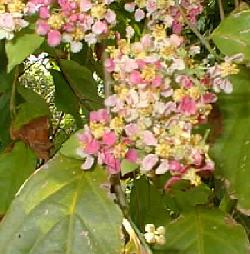Environmental News Service
November 5, 1999
WASHINGTON, DC, November 5, 1999 (ENS) - Indigenous peoples from nine South American countries won a precedent-setting victory Thursday, as the U.S. Patent and Trademark Office (PTO) canceled the patent issued to a U.S. citizen for the ayahuasca vine.
The plant, Banisteriopsis caapi, is native to the Amazonian rainforest. Thousands of indigenous people of the region use it in sacred religious and healing ceremonies, as part of their traditional religions.
The PTO's decision came in response to a request for re-examination of the patent filed with the PTO in March by the Coordinating Body for the Indigenous Organizations of the Amazon Basin (COICA), the Amazon Alliance for Indigenous and Traditional Peoples, and lawyers at the Center for International Environmental Law (CIEL).
"Our Shamans and Elders were greatly troubled by this patent. Now they are celebrating. This is an historic day for indigenous peoples everywhere," says Antonio Jacanamijoy, general coordinator of COICA.
 Ayahuasca (Banisteriopsis caapi)
Ayahuasca (Banisteriopsis caapi)
(Photo courtesy Ayahuasca Home Page)
According to David Rothschild, director of the Amazon Alliance, "Ayahuasca is used in sacred indigenous ceremonies throughout the Amazon. This patent never should have been issued in the first place."
The PTO based its rejection of the patent on the fact that publications describing Banisteriopsis caapi were "known and available" prior to the filing of the patent application. According to U.S. patent law, no invention can be patented if described in printed publications more than one year prior to the date of the patent application.
William Anderson, director of the University of Michigan Herbarium, said that the PTO needs to improve its procedures for researching applications.
CIEL lawyer David Downes said, "While we are pleased that the PTO has cancelled this flawed patent, we are concerned that the PTO still has not dealt with the flaws in its policies that made it possible for someone to patent this plant in the first place." He explained that "the PTO needs to change its rules to prevent future patent claims based on the traditional knowledge and use of a plant by indigenous peoples."
He also argued that "the PTO should face the issue head-on of whether it is ethical for patent applicants to claim private rights over a plant or knowledge that is sacred to a cultural or ethnic group."
In a separate proceeding at the PTO, the three groups have called for changes in PTO rules. They argue that the PTO should require that patent applicants identify all biological resources and traditional knowledge that they used in developing the claimed invention. Applicants should also disclose the geographical origin, and provide evidence that the source country and indigenous community consented to its use.
The plant, Banisteriopsis caapi, is native to the Amazonian rainforest. Thousands of indigenous people of the region use it in sacred religious and healing ceremonies, as part of their traditional religions.
The PTO's decision came in response to a request for re-examination of the patent filed with the PTO in March by the Coordinating Body for the Indigenous Organizations of the Amazon Basin (COICA), the Amazon Alliance for Indigenous and Traditional Peoples, and lawyers at the Center for International Environmental Law (CIEL).
"Our Shamans and Elders were greatly troubled by this patent. Now they are celebrating. This is an historic day for indigenous peoples everywhere," says Antonio Jacanamijoy, general coordinator of COICA.
 Ayahuasca (Banisteriopsis caapi)
Ayahuasca (Banisteriopsis caapi)(Photo courtesy Ayahuasca Home Page)
According to David Rothschild, director of the Amazon Alliance, "Ayahuasca is used in sacred indigenous ceremonies throughout the Amazon. This patent never should have been issued in the first place."
The PTO based its rejection of the patent on the fact that publications describing Banisteriopsis caapi were "known and available" prior to the filing of the patent application. According to U.S. patent law, no invention can be patented if described in printed publications more than one year prior to the date of the patent application.
William Anderson, director of the University of Michigan Herbarium, said that the PTO needs to improve its procedures for researching applications.
CIEL lawyer David Downes said, "While we are pleased that the PTO has cancelled this flawed patent, we are concerned that the PTO still has not dealt with the flaws in its policies that made it possible for someone to patent this plant in the first place." He explained that "the PTO needs to change its rules to prevent future patent claims based on the traditional knowledge and use of a plant by indigenous peoples."
He also argued that "the PTO should face the issue head-on of whether it is ethical for patent applicants to claim private rights over a plant or knowledge that is sacred to a cultural or ethnic group."
In a separate proceeding at the PTO, the three groups have called for changes in PTO rules. They argue that the PTO should require that patent applicants identify all biological resources and traditional knowledge that they used in developing the claimed invention. Applicants should also disclose the geographical origin, and provide evidence that the source country and indigenous community consented to its use.

